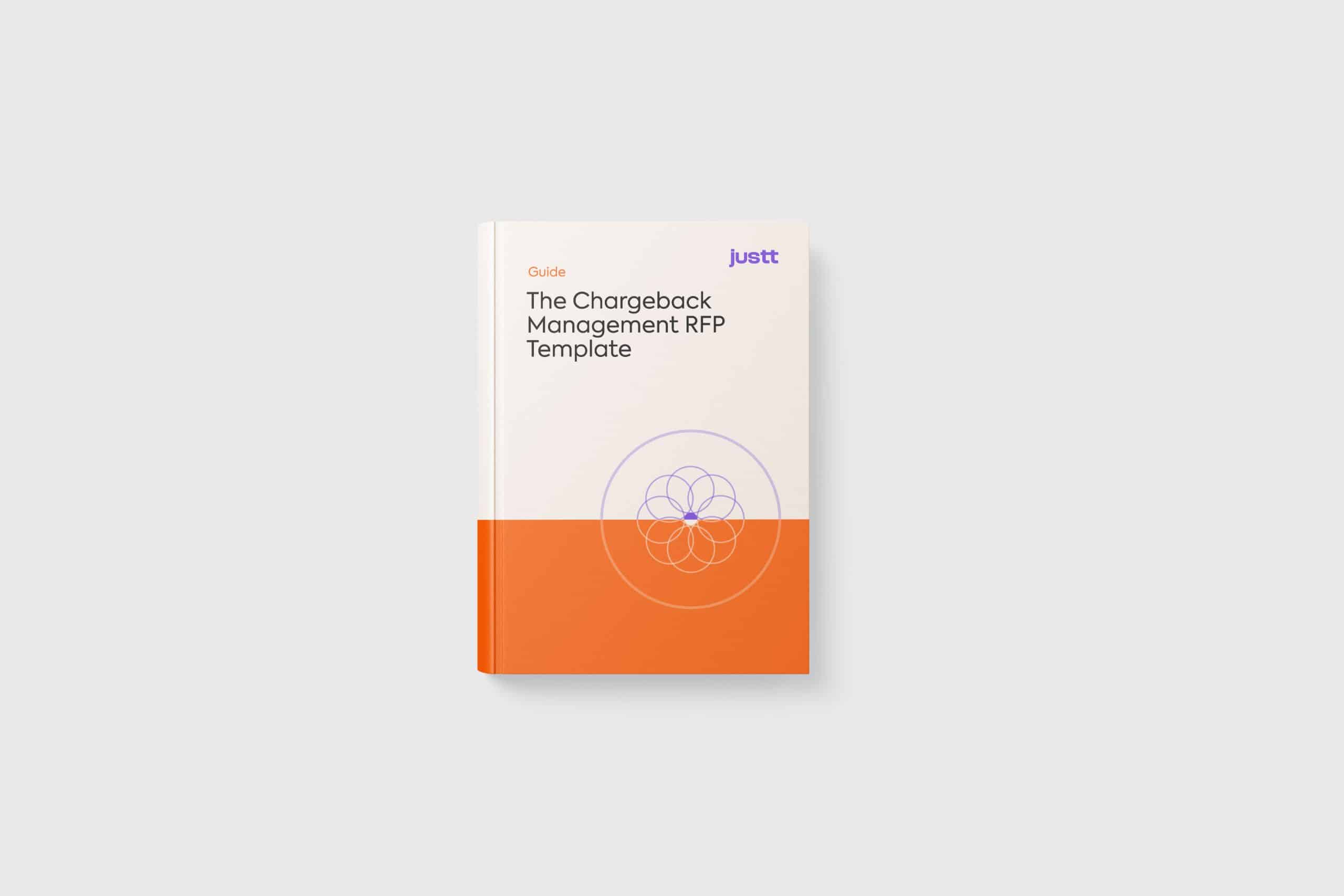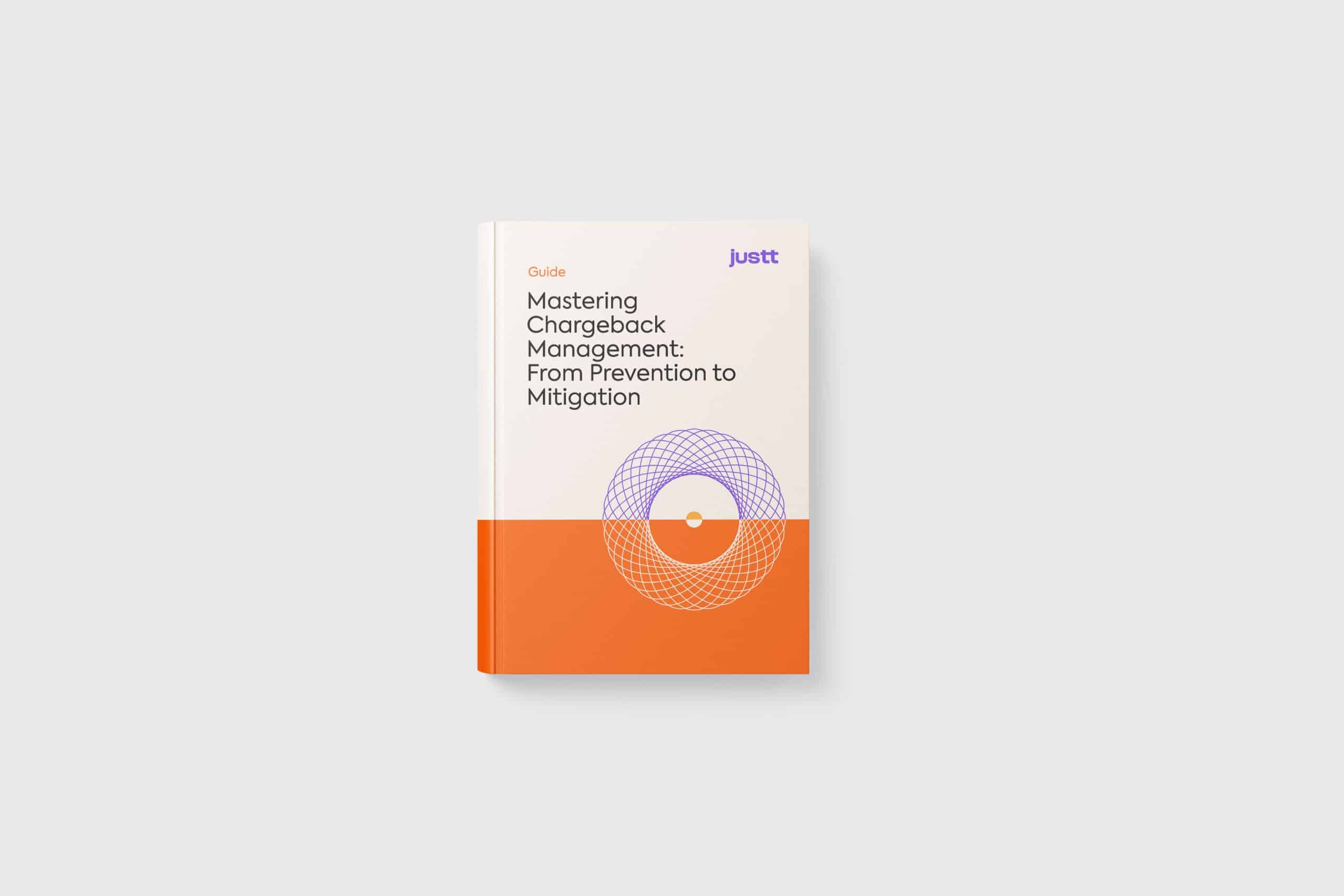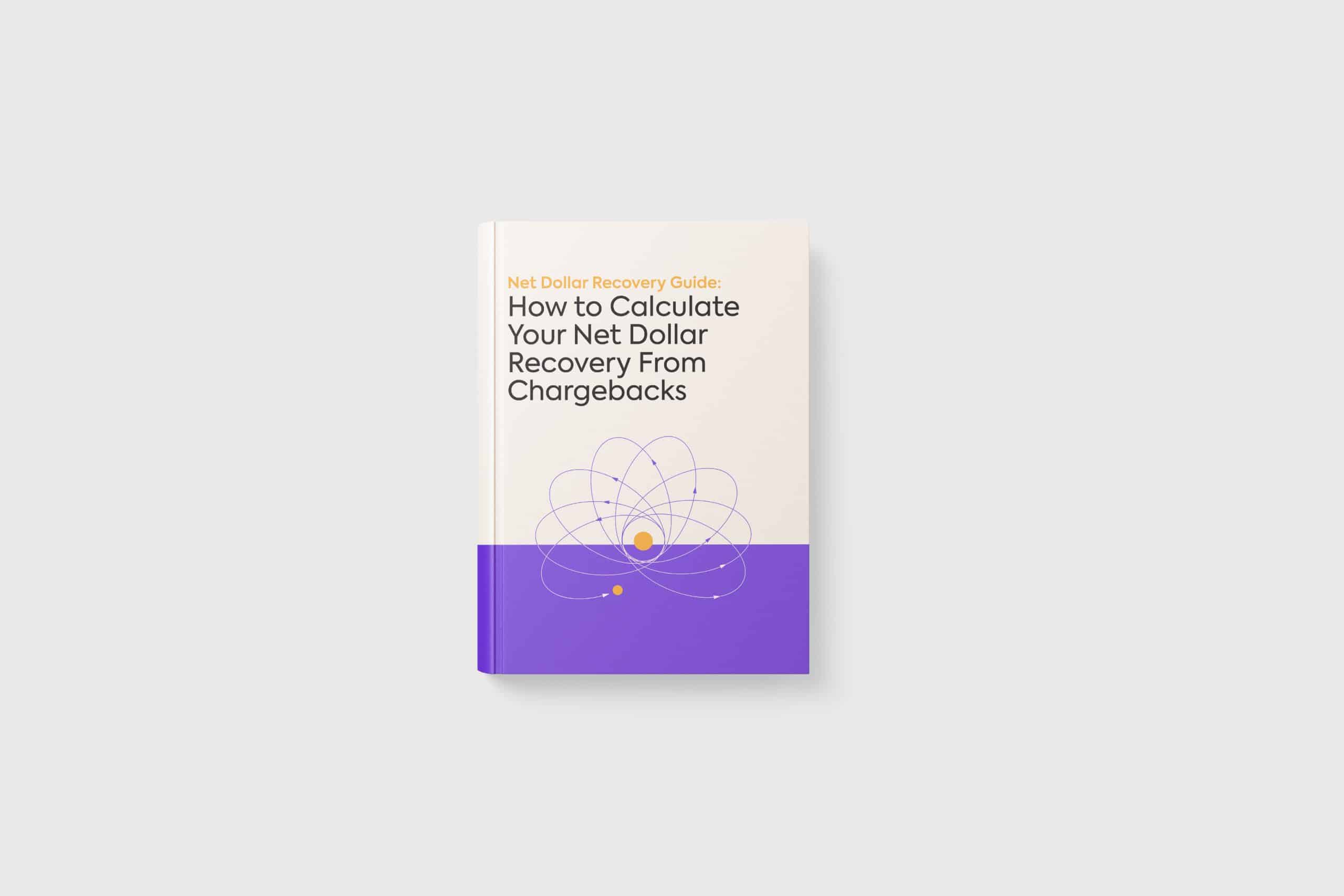A practical framework for evaluating vendors
An RFP (Request for Proposal) template provides a structured framework for requesting bids from vendors on specific projects or solutions. It saves time and ensures consistency by asking each vendor to respond to the same set of requirements.
When merchants look for a chargeback management solution, knowing what to ask can quickly filter a crowded market and help you evaluate your shortlist. Sales conversations often sound the same, but an RFP helps you dig into detailed information on the features you’re buying — like automation, data access, optimization, reporting, and more — so you can evaluate solutions based on what matters most to your business.
Key Takeaways
- Merchants often evaluate chargeback management vendors through an RFP.
- Justt created a free Chargeback Management RFP Template to simplify the process.
- The template covers key categories: automation, data enrichment, optimization, and analytics.
- Using the template ensures structured vendor evaluations.
- Download the editable template for free.
The Chargeback Management RFP Template
We’ve created a Chargeback Management RFP Template to make the process easier. It’s a ready-to-use framework that combines general RFP structure with the specific capabilities that matter in chargeback management.
The template is free for merchants to download, adapt, and use. You can use it as-is or tailor it to your team’s requirements.
Key Areas Covered in the Template
The template organizes vendor questions into six categories:
Automation & Argument Customization
Evaluate how much of the dispute process is automated, whether arguments can be customized per case or issuer, and if the system scales during high-volume periods.
- Does your solution deliver fully automated chargeback responses?
- Does your solution customize resposes 100% of the time?
- Can your platform create unique representments on an argument by argument data based on data from the individual case?
- Does your solution have the ability to order evidence in a representment to increase the chances of winning?
- How does your system manage fluctuations in dispute volume while ensuring uninterrupted performance?
- Is there a need to login to PSPs to submit chargebacks?
- Does your solution conduct A/B testing on an argument by argument basis?
- How does your solution adapt responses according to rule and industry changes?
- Does your solution implement network-wide knowledge per PSP, reason code, industry, etc so all merchants benefit from knowledge?
- How is continuous improvement of win rates achieved?
- What role do machine learning or AI algorithms play in optimizing your chargeback management process?
Data Access & Enrichment
Look at how evidence is retrieved and enriched: PSP integrations, API or CSV uploads, manual entry, third-party sources, and predefined evidence libraries.
- Does your platform directly retrieve dispute-related data from payment service providers? If so, how is this integrated?
- Can merchant data be enriched via API?
- Does your system allow bulk uploads of merchant data via CSV? What does that workflow look like?
- Can our team manually edit or enter additional data directly within your platform interface?
- What external data sources can your system pull from to strengthen dispute cases?
- How many different data points can your platform pull from third party providers to include in representments?
- Does your solution provide a built-in library of evidence types that can be automatically included in disputes?
- Which types of data does your platform collect and utilize specifically for digital goods merchants?
- Which types of data does your platform collect and utilize specifically for travel merchants?
- Which types of data does your platform collect and utilize specifically for event ticketing merchants?
- Which types of data does your platform collect and utilize specifically for SaaS merchants?
- Which types of data does your platform collect and utilize specifically for cryptocurrency merchants?
- Which types of data does your platform collect and utilize specifically for gaming merchants?
- Which types of data does your platform collect and utilize specifically for financial services merchants?
- Please list which PSPs you are integrated into.
- Please describe any integration requirements a merchant must complete in order to automatically manage and respond to chargebacks.
Optimization & Decisioning
Understand how the solution supports smart decision-making, including A/B testing, ROI-based fight/accept rules, and optimized data selection.
- Does your solution have the capability to automate fight or accept recommendations per case based on expected ROI, taking into account fees, value, and likelihood of success?
- Does your solution have the ability to automatically select the most relevant data for a particular chargeback case?
- Does your solution offer the ability to configure auto-accept rules?
- Does your solution offer the ability to configure which chargebacks to automatically dispute?
Visibility & Analytics
Check for dashboards, forecasting tools, and reporting capabilities across dispute reasons, PSPs, fraud vs. non-fraud, payment methods, and card schemes.
- What are the reports you provide and could you describe the technical details of how you give those to merchants?
- Does your solution offer a central dashboard with unified visibility across PSPs?
- How does your solution address forecasting and revenue prediction?
- Can your reporting break down disputes by individual reason codes, and how granular is that reporting?
- Can your reporting break down disputes by fraud vs. non fraud?
- Does your platform generate reports that segment disputes by payment method (e.g., credit card, ACH, wallet)?
- Can you provide dispute reporting broken down by card networks such as Visa, Mastercard, Amex, etc.?
- Do you provide reporting that aggregates disputes across all PSPs as well as reporting segmented by individual PSP?
- Do you provide reporting on fought and not-fought chargebacks along with reasons for not fighting disputes?
Pre-Dispute Alerts
Confirm whether the solution integrates with networks like Verifi (CDRN, RDR) and Ethoca to prevent disputes before they become chargebacks.
- Do you integrate with Verifi’s CDRN program, and how are pre-dispute alerts delivered and managed in your platform?
- Can your solution process Rapid Dispute Resolution (RDR) alerts from Verifi, and how are they actioned?
- Does your platform support Ethoca pre-dispute alerts, and how are merchants notified and expected to respond?
- Can thresholds be set to accept or ignore alerts based on selected criteria (region, amount, etc.)?
Notifications
Review the types of alerts available, from high-value cases to enrichment reminders, escalations, and case outcomes.
- Does your platform provide special notifications or workflows for high-value chargeback cases?
- How does your system remind merchants to enrich or complete data for disputes?
- How are chargeback notifications for new cases communicated to merchants through your system?
- How are chargeback notifications for won cases communicated to merchants through your system?
- Please describe how your solution handles chargeback notifications for pre-arb escalation.
- How are chargeback notifications for pre-chargeback alerts summary communicated to merchants through your system?
Security & Compliance Standards
Ensure the provider meets relevant compliance and data security standards (e.g., PCI DSS, GDPR) to protect sensitive payment information.
- How does your solution ensure compliance with GDPR regulations?
- How does your solution ensure compliance with CCPA requirements?
- Do you maintain SOC 2 certification, and how is this applied within your chargeback management system?
- Is your platform certified under ISO 27001, and how do you apply its security standards?
- What ISO 27017 cloud service security controls are supported by your solution?
- How do you comply with ISO 27018 standards for personal data protection in cloud environments?
- How is ISO 27701 privacy information management incorporated into your platform?
- Can you provide an A-rated vendor risk report, and how do you maintain that rating?
- How can you ensure that you only access absolutely necessary merchant data to fight disputes?
- How long do you keep the chargeback data in your system?
- How do you ensure secure data transmission during integration? (e.g., encryption protocols)
Support & Collaboration
Clarify the level of customer and technical support offered, including response times, onboarding help, and ongoing account management.
- Do you provide a dedicated account manager, and what responsibilities do they cover?
- What access do we have to industry experts on your team, and how do they support merchants?
- How do you support merchants as they scale?
- Please provide both SLAs and proposed KPIs that will govern the service, including remedies for not meeting the SLAs.
- How do you measure the quality of your service?
- What involvement is needed from us in managing chargebacks and fighting disputes?
- What kind of details will we need to provide to you to help fight chargebacks?
- Do you provide a dedicated integration team or support during the setup phase?
- Describe what the onboarding process entails and how long it takes.
These categories reflect what merchants consistently need (and ask for) in order to improve recovery rates, manage operations efficiently, and reduce losses.
The Strategic Advantage of a Strong RFP
An effective RFP can make all the difference, helping your team:
- Align internal stakeholders (finance, ops, compliance) around the criteria that really matters before you even start looking at solutions on the market
- Know exactly what you’re buying, at the feature level
- Differentiate between similar-sounding sales pitches
- Accelerate vendor selection
Ultimately, the right RFP sets you up to choose the best-match vendor that will be effective in reducing chargeback losses, improving win rates, and freeing your team from manual dispute work.
Get the Template
We’ve made our RFP template available as a free download so you can use it immediately in your vendor evaluation process.
[Get the Chargeback Management RFP Template here]
Frequently Asked Questions
What is a chargeback management RFP?
A chargeback management RFP (request for proposal) is a structured document merchants use to compare vendors. It standardizes the questions and features each vendor must address so merchants can evaluate solutions side by side.
Why should merchants use an RFP for chargeback solutions?
An RFP helps merchants cut through vendor marketing and focus on measurable features like automation, analytics, and scalability. It prevents vague comparisons and ensures vendors are evaluated on the same criteria.
What should be included in a chargeback management RFP?
The most effective RFPs cover automation and customization of representments, data access and enrichment, optimization and decisioning, and visibility and analytics. These categories ensure merchants get a holistic view of vendor capabilities.
How does Justt’s RFP template help merchants?
Justt’s free template highlights the most important features to ask about, ensuring merchants don’t miss critical areas that impact recovery rates and efficiency. It accelerates vendor evaluation and helps merchants identify which solution best fits their needs.



